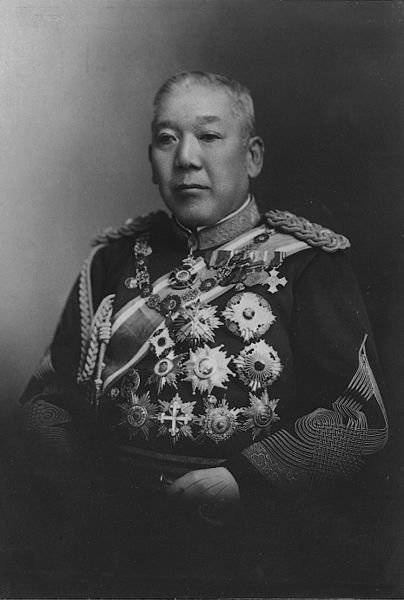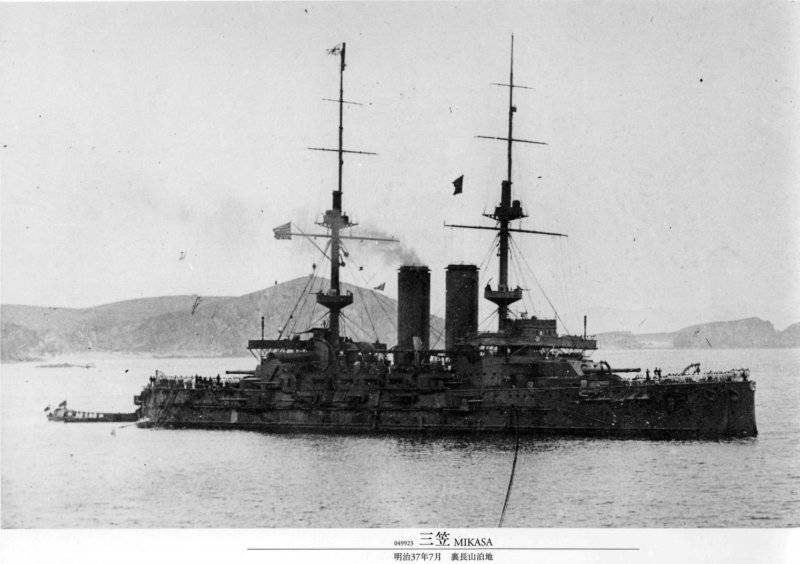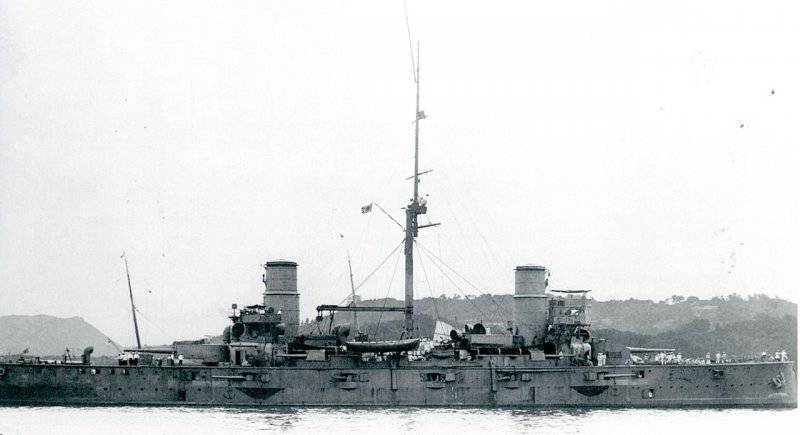The beginning of the Russian-Japanese war. The armed forces of the Japanese Empire
In 1896, the Japanese government, considering the shipbuilding program of the 1895 of the year insufficient, additionally adopted a program designed for 10 years. It focused on the construction of cruisers and destroyers, necessary for cruising war, the impact on enemy communications, as well as the development of naval infrastructure. To support the actions of the seaports in the Yellow and Japan Seas, naval bases, ports and shipyards were built. By the beginning of the war with Russia, the Japanese transport fleet had the opportunity to simultaneously transfer to the Korean Peninsula two divisions with all weapons, ammunition and equipment.
Squadron battleship Mikasa, July 1904 of the year.
In 1903, the third shipbuilding program was adopted at a special meeting of the Japanese parliament. At the beginning of the 1904 of the year, immediately before the start of the war, the British firms Vikkers and Armstrong received an order to build two squadron battleships Katori and Kashima (battleships of the Katori type). Their total displacement was 16,6 thousand tons. Armed with four 305-mm / 45, four 254-mm / 45 and twelve 152-mm / 45 guns. "Neutral" England literally in a year and a half put into operation two powerful battleships - in 1906, they entered service with the Japanese fleet.
By the beginning of the war, the Japanese Empire had 6 squadron battleships (Mikasa, Asahi, Sikishima, Hatsuse Fuji, Yashima) and 6 armored cruisers (Asama, Tokiwa, Azuma, Yakumo "," Izumo "," Iwate "). Most of them were built by the "mistress of the seas" by Britain and had some technological advantage over Russian ships. Thus, the Japanese naval artillery surpassed the Russian in mass of the projectile (of the same caliber) and technical rate of fire, therefore the side salvo of the Japanese squadron during the battle in the Yellow Sea (August 10 1904) was about 12 418 kg compared to 9111 kg in the Russian squadron in Port Arthur In addition, in 1903, Japan was able to buy two armored cruisers of Italian construction from Argentina. The cruisers Kasuga and Nissin entered service at the beginning of the war and took an active part in it.
The strength of the Japanese fleet was personnel. Thanks to the development of merchant shipping and maritime industries in the country, it mainly consisted of natural sailors. Many experts had experience of the Sino-Japanese war. Another advantage of the Japanese fleet is the development of infrastructure. The Japanese fleet had well-equipped ports and docks, which facilitated the supply and repair.
"Kasuga" 1 class armored cruiser.
In 1900-1904 The power of the Japanese army was significantly increased. It was completed on the basis of the law on universal conscription adopted in 1872 year, which extended to men 17-40 years. The following year, established six territorial districts. Initially, French officers were involved as instructors, and then German officers. The service shared a valid, spare 1-th and 2-th category (territorial troops) and the militia. Given the fact that in peacetime there were more recruits than needed, the selection was carried out by drawing lots. 3 of the year served in the army, 4 of the year in the fleet. The man was listed as 1 of the year and 4 of the month for the 4 class, 2 for the year, and was then considered a militiaman. In addition, there was a police that was supposed to protect the islands, they called for it for a year.
The peacetime Japanese army numbered 180 thousand. After mobilization, Japan could expose more than 400 thousand people. Taking into account the reserve army numbered 850 thousand. People. The emperor was the commander-in-chief of the imperial armed forces. The central agencies that led the army were the Ministry of the Army, the General Headquarters of the Army and the General Inspectorate of Military Training. The Ministry of the Army was established in 1872, the General Staff in 1878 (the General Fleet Headquarters was created in 1893), the Main Military Training Inspectorate was formed in 1900. In 1900, the Military Council was established under the Emperor (Mikado).
The core of the army was the officers, who inherited the traditions of the samurai. The officer was a stronghold of the Japanese Empire, was the bearer of the idea of "Great Japan", the exclusivity of the Japanese people. It should be noted that the Japanese officers were quite well prepared and showed exceptional courage and resilience in battle, was brought up on the basis of the concepts of the “warrior code”. Although in general, middle-level officers were not distinguished by initiative, preferring to strictly follow the orders of the command. In addition, the advanced German military school at that time influenced the education of Japanese officers. The officers of the General Staff suffered from the isolation of ordinary officers. Many of them were educated in France and Germany.
The army was a rigid hierarchy and discipline. The officer was the bearer of the will of the emperor (respectively, of the gods). On the basis of complete submission to the will of the commander and rigorous execution of orders, soldiers were brought up. Therefore, the personnel of the Japanese army was distinguished by stubbornness and fanaticism in battle. This type of soldier was praised by the Japanese press. Service in the armed forces was considered the highest honor, which could not be compared with other specialties. Typically, speeches by representatives of the imperial house and senior government officials provided for praise to the army and navy. Army and Navy Day was the brightest holiday of the Japanese Empire. The farewell ceremony was equated with the funeral and became a very important ceremony in the life of the Japanese. The wires were celebrated very solemnly. The future fighter expressed readiness to die in the interests of the empire.
Generals and officers respected all society, they had the highest status in Japan. In order to create the illusion of social justice, the nomination of middle-level and especially lower-level officers was allowed to nominate soldiers (usually peasants) who succeeded in the service. In general, the society was heavily militarized.
The militarization of society was promoted by the territorial principle of recruiting the Japanese army. Japanese military units had strong ties with the local civil administration, jointly controlling local life. The military kept future recruits and reservists in their field of vision, and often established close contact with their families. It is necessary to take into account such a very strong side of the Japanese army as the general literacy of the population. As Admiral Makarov wrote, in Japan for five centuries there has not been a single illiterate. From generation to generation, the Japanese were accustomed to learn and very quickly absorbed advanced European achievements. Japanese soldiers were trained from school. From school, the young man was inculcated with the idea that "Japan has a primary role in the East", that "there is no force capable of crushing Japan." Also promoted the idea of overpopulation of Japan and the need to expand the territory for the growth of the welfare of the people. After Russia intervened in China and Japan, the Liaodong peninsula was taken away from the Japanese, Port Arthur was taken away, the Japanese were taught to think about the inevitability of a battle with the Russians, the need for revenge. Often school students participated in military exercises.
On the eve of the Russian-Japanese war, the rank of senior sergeant-major in the Japanese army was introduced. It was an experienced, professional soldier, who passed all the stages of service directly in the unit, who became the commander of a branch or semi-platoon. Politically, they chose supporters of the monarchy. The senior sergeant fébébels could prepare and pass the examination for an officer’s rank without interruption from service.
Operational art in the Japanese army was impressed by the victories of Prussia in the unification of Germany. The commander-in-chief of the Japanese armies, Oyama Iwao (Oyama) during the Franco-Prussian war of 1870-1871. was with the Prussian troops, studying the best practices of warfare. In 1884, a professor at the Berlin Military Academy, Meckel, arrived in the Japanese Empire. From that time began a comprehensive reorganization of the Japanese army on the German model. Meckel wrote charters and instructions for all branches of the Japanese army, and established the Tokyo Military Academy. All senior Japanese officers became students of the German professor. In addition, the Japanese carefully studied the experience of the Anglo-Boer War. As a result, Japanese military art avoided frontal actions that could lead to great losses, sought to bypass the flanks and the enemy’s environment. At the same time, it should be noted that the Japanese army was inherent in schematism and stereotyped. If the Japanese could not conduct an operation to grip the enemy’s flanks, they lost the initiative, were lost, did not know how to proceed. The imitation of the “military art of Moltke” for some time brought success to the Japanese army, but could lead to a military catastrophe if the Russian army was led by the generals of the “Suvorov school” and it would have had the opportunity to continue the struggle further.
The Japanese infantry was armed with X-NUMX-mm Arisaka rifles of the 6,5 model of the year (Type 1897). Length 30 mm, weight 1270 g. Shutter sliding, swivel. Shop middle with a chess arrangement of cartridges. In the cage 3900 ammo. Bayonet weight in 5 g with hewing blade. The reserve and territorial troops were armed with murat system guns. The value of machine guns in the Japanese army has not yet been understood, so there were a small number of them in service. Hotchkiss machine guns only passed tests. However, during the war, the Japanese army, actively modernized by the British, gained some advantage in this segment over the Russian army.

Arisaka rifle.
The Japanese Army’s artillery fleet was based on the 75-mm field gun of the Arisaka’s 1898 model of the year, and the 75-mm mountain gun of the 1898 model of the year. Both guns had trunnions with trunnions and tough gun carriages. There were no shields. Partial damping of the recoil of the gun when firing was carried out with the help of shoes that were put under the wheels. The bolt of the guns was piston. The loading of a field gun unitary unitary, the mountain - separate-sleeve. Mountain cannon could be disassembled into four parts. Shells at the guns were the same. The steel grenade weighed 6,1 kg and had a length 4,5 caliber. Shrapnel also weighed, but was shorter - 3,5 caliber. The maximum firing range was at the field gun - 7,8 km, at the mountain - 4,3 km. In the mountain cannons, the Russian army was inferior to the Japanese army several times.
In addition, during the war, Japan ordered 400 field 75-mm Krupp guns. Also, the Germans put 2 thousand blanks for such guns. Of these, 300 cannons were made in the arsenal of the city of Osaka. Later this gun was modernized, and it was called the Arisaka system of the 1905 model of the year (type 38). The Japanese also ordered several dozen 12- and 15-cm (120- and 150-mm) Krupp howitzers from the Germans during the war. The fortress and siege artillery had Krupp guns of large calibers, up to 280-mm guns. Own military industry of the Japanese Empire was in its infancy, so the Japanese imported guns from the factories of Krupp and Schneider (machine guns were also brought from abroad).
The highest tactical unit of the Japanese army was the division. In wartime provided for the formation of the army. So, before the beginning of the war with Russia, three armies were formed. The first divisions formed in 1885, then they created the 6 divisions. A few years later formed the Guards Division. During the war with China, Japan had 6 army divisions and 1 Guards division - 64 thousand people who turned to 171 thousand people in wartime. New reorganization in the army held after the war with China. At the start of the war, Japan deployed 13 divisions and 13 reserve brigades with a total of 375 thousand. The division consisted of two infantry brigades of double-regimental composition, the regiment consisted of three battalions, the battalion of four companies. The division also included a three-squadron cavalry regiment, and a two-division artillery regiment, each division had three batteries of six guns each. The division also had a sapper and a wagon train battalion. In wartime, the division received part of the gain. A war company had a 217 man in the state, a sapper company had a 220 man, a field battery had 6 guns, a 150 man.
Guards and 1-I divisions of the capital were more powerful in their composition. Each of them had not a cavalry regiment, but a cavalry brigade of two regiments of five squadrons, as well as an artillery brigade of three regiments, with two divisions in each, in each division there were three six-gun batteries. Army artillery consisted of divisions and batteries included in the divisions. The foot field and mountain artillery was reduced to 13 artillery regiments, which were attached to the divisions, and two artillery brigades.
One of the peculiarities of the Japanese divisions was the presence of numerous porters. As part of the army for each division during the war were 6 thousand. Porters. The need for such a large number of porters was associated with the weakness of the transport and the underdevelopment of the road network of the Manchurian theater of operations. The impossibility of creating a corps organization in such conditions led to the fact that it was necessary for each division to give tactical and economic independence. Subsequently, the Japanese created a network of field railways in a number of regions and organized a system of warehouses, which facilitated the supply of troops.
On the eve of the war, the Japanese Empire conducted the deployment of the army according to the plan of wartime. To this end, 52 reserve infantry battalions, 52 reserve batteries (312 guns) were formed to reinforce the existing troops. To compensate for the loss in the army formed 19 spare batteries (114 guns). As a result, the Japanese army in the state of peacetime had among the 13 artillery regiments of the divisional and 7 regiments of army artillery 704 guns, and in the wartime state 1130 guns. Japan faster than Russia was able to deploy its artillery in the theater of operations. The gunners as a whole had good training and, although the Japanese artillery was inferior in range and speed of fire, good technical training and ability to shoot from closed positions gave the Japanese an advantage at the beginning of the war. Subsequently, when the Russians also learned to shoot well from closed positions, the situation changed dramatically in their favor. In artillery duels, the victory was almost always left to the Russian artillerymen.
In Russia, the Japanese army was underestimated. Combat training of the troops was considered low. Japanese artillery was called unsatisfactory. It was believed that poorly trained engineering troops. The weakness of the Japanese cavalry was noted. In fact, these estimates are outdated, they are consistent with the Japanese army sample 1870-1880-s. Japanese troops were trained by advanced German specialists, and in their preparation they approached the Western European standard. The army inculcated offensive tendencies, but they got along with the traditional Japanese caution and some slowness.
The Japanese really had a traditionally weak cavalry. She usually did not tear herself away from her infantry. Cold weapons The Japanese cavalry in the attack did not use and dismounted during a combat clash for a firefight. Almost did not lead cavalry and intelligence activities. In the intelligence business, the main hopes were pinned on spies.

Oyama Iwao (1842-1916). In 1899 — 1904, the Chief of General Staff. Under his leadership, a plan of war with Russia was developed and the Japanese army was thoroughly prepared for the campaign. In June, 1904 was appointed commander-in-chief of Japanese forces in Manchuria and on the Liaodong Peninsula.


Information